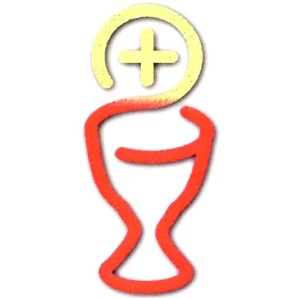“I think Sacraments have lost their relevance today to be honest. They don’t have the same impact they used to have!” – An elderly parishioner (not of this parish)
I recently read a headline in The Telegraph which read, “British families don’t eat together – and, if they do, it’s often in front of the TV.” The article went on to report that “More than one in five families only sit down to eat a meal together once or twice a week, according to a new survey. And 40 per cent of families only sit down together to have a meal three times a week.” It is widely noted that “we live in a ‘fast food’ society”. This encouraged me to reflect on the Sacrament of the Eucharist and the importance and place of this Sacrament in a modern ‘fast food’ society.
In today’s society, people find themselves rushing, multi-tasking and stressed. A recent study indicated that 37% of British adults feel stressed at least once a day and 85% of adults experience stress regularly. The world and society in which we live does not give people time to ‘commune’ or to take time to greet strangers. Society does not even seem to give most of us time to sit down together to share in a meal.
For Christians, the Eucharist marks a time when they achieve and realise unity not only with Jesus Christ, who is embodied in the bread and wine through transubstantiation, but also with one another – a time when they fully participate and work together as the Body of Christ on Earth. For me, this is a time of unity and togetherness as we share in the meal that Christ gave to us at the Last Supper.
St. Thomas Aquinas said that the bread and wine do not physically change in terms of their matter – they undergo a deeper change. Their very essence becomes the body and blood of Christ. He argues that God is the one who can enact this change and that it is beyond the comprehension of humans. So, rather than trying to rationalise how the change comes to be, the relevance of the Eucharist today is the power that it has to change us when we share in this Sacrament. We are nourished with spiritual food for the journey of our lives. The Eucharist is a time when we break away from the ‘fast food’ society.
In the Eucharist, Christians share in Jesus’ modified version of the Passover meal, in which he broke bread with his disciples before His Passion and death on the cross. Jesus becomes the sacrificial lamb, freeing Christians from slavery of sin. Not only is the society in which we live becoming increasingly stressful, but it is also becoming increasingly filled with vices and distractions that take us away from God. To my mind, we need the saving power of Christ in our lives more than ever – and this can only be fully achieved through communion with Christ and by receiving him through this Sacrament.
I once asked Rev Deborah what her feelings were on the importance of the Eucharist – her response was “it brings me closer to God” and “it’s a corporate act”. A Sacrament is defined as an outward sign of an inward grace. I believe that this definition is most perfectly encapsulated in the Sacrament of the Eucharist and links to the comments from Rev Deborah. The Eucharist is designed to provide us with nourishment and fulfilment on a personal level with Christ; through this sacrificial meal, Christ welcomes us back into his love for us. It also unifies Christians through the invitation to eat with him.
In a world of crowded offices, train stations, divisions between groups of people, increasing levels of stress and the constant demand to succeed, the Eucharist continually reminds us of two key ideas – firstly, Jesus is always with us – he is substantially with us in the Eucharist and secondly it reminds us of the unity that must exist. The common sharing of the Eucharist across the world is more powerful than arbitrary borderlines and divisions – it transcends class, colour, age, virtue or sinfulness.
While we may no longer eat together in our homes in Britain, globally 2.56 billion Christians do eat together when they share the Eucharist.
Tom D
